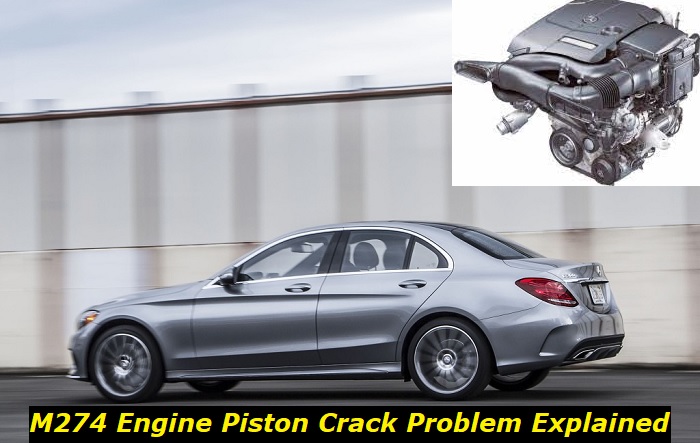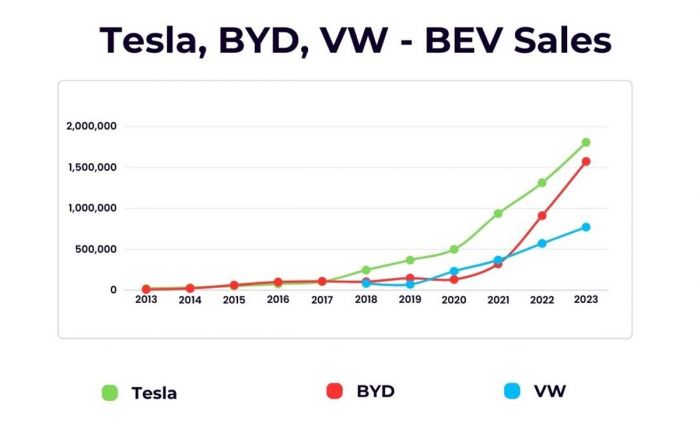Mercedes engines are rarely bad. The M274 engine proves this by lasting much more than the manufacturer stated initially. But still, this wonderful engine doesn't come without its share of pain for Mercedes owners. One of the key problems that is extremely common is the problem with pistons and this is weird as no other Mercedes engines have this issue so often.
Key features and my opinion about the engine
- Production years:2011-now
- Average lifespan of M274:180,000-210,000 miles
- Fuel supply type:direct injection
- Power range:129-333 hp
- Fuel efficiency:excellent
- Engine block material:aluminum
- Engine reliability score:medium
- The most common problems:very weak phasers, chain problems, afraid of any kind of overheating, a lot of leaks.

Symptoms of piston damage in the M274 engine
Before we talk about the actual problems in the construction of this machine that cause piston damage, I want to show you the symptoms. This will obviously help you identify the problem at an early stage and maybe prevent fatal engine damage.
So, the pistons in the M274 may crack because of several reasons and this will immediately lead to issues with its efficiency and performance. Although you still can drive the car with an engine that has one cracked cylinder, it's not recommended that you do so. At least, you shouldn't drive it for a long time.
Here are the symptoms:
- your engine starts misfiring - one of the cylinders loses compression, so it just stops working at all;
- your engine starts burning oil - the oil gets through the crack in the piston to the dead cylinder, then moves on to the exhaust system and burns them;
- you may see black smoke from the tailpipe - this is another sign of the burning oil;
- the engine loses its power - your M274 will drive like a lazy turtle with one cylinder off;
- most likely, you will see the check engine light - the most obvious code is "cylinder misfire" in a certain cylinder;
- fuel will get to the crankcase and dilute oil which will result in high oil level, light oil with unusual viscosity, and fuel smell from the engine.
These are the first symptoms you will feel when one of the cylinders is cracked. The symptoms show up unexpectedly and very fast, you won't feel that they get worse after some time. The cylinder stops working immediately when the piston gets a crack in it.
Unfortunately, there are little to no signs that your Mercedes engine is going to have a crack in the cylinder. But if you hear the engine knock and get the P0300 code regularly, you should address this problem. Don't wait till you have a cracked piston!
What are the common reasons for cracked pistons in the M274?
The obvious culprit of this problem is the construction issue. Mercedes engineers made a mistake they didn't want to acknowledge. These engines were made from 2011 and up to 2015 there were no problems with pistons. If you have an M274 engine that was made up to 2015, you aren't likely to experience this problem at any mileage.
But in 2015, Mercedes decided to update the M274 engine. This update brought some more fuel economy but the misfiring and knocking issues became much more common. Usually, the knocking engine is the sign that one of the pistons is going to say goodbye to you.
But here are some reasons mechanics are talking about:
- low-grade fuel - people tend to use cheaper fuel for their cars now but low-quality gas may cause piston damage in this engine;
- defective piston rings - the rings were one of the updated features and they appear to be the culprits of cracks;
- abusive driving - usually, the piston will crack when you try to rev up the engine high and still use low-grade gasoline;
- poor maintenance - a well-lubricated and optimally heated engine will most likely avoid this problem during its lifetime.
I also have the feeling that the complicated oil pump has something to do with the piston damage. The piston may crack when it's overheated because of poor lubrication. The oil pump in this engine has a variable oil pump but its valve can get stuck because of wiring issues. This may cause oil leak issues but also will likely cause poor lubrication when your engine is revving up high.
Another issue is connected with cooling. The thermostat and water pump are not the most durable and reliable in the M274 engine, so they may fail. If you don't spot the problem on time, it may easily add to overall issues in this engine and this will eventually lead to piston crack.
How to locate a piston crack in the M274?
Well, for this, you will most likely need to go to a good mechanic. Mercedes dealerships are good at diagnosing such problems but they are going to take loads of money out of your pocket. Independent Mercedes shops are OK and you may find a good one using customer reviews and friends' advice.
So, the diagnosis of this problem has several stages:
- Code reading. Your ECU will obviously have the code that will tell which cylinder is malfunctioning. P0301 for the first cylinder, P0302 - for the second one, etc.
- Compression test. After you know which cylinder malfunctions, you should run a compression test in all 4 cylinders. The cylinder with the cracked piston will have zero compression.
- Air leak test. You will need to use special equipment to send pressed air to the cylinders and to see if it leaks. The broken cylinder should have a 100% air leak to the crankcase.
- Visual inspection. After everything says about the piston crack, you should take the engine apart and inspect the piston. It's easy to notice the crack in it.
Can you prevent piston damage in the M274 engine?
Although this problem has something to do with Mercedes engineers, you still can control it. Your actions may prevent this problem from happening or make it happen sooner. It's not only about the maintenance and overall care, this thing has a lot of factors in it.
Here's what you may try doing to lower the risk of piston crack in your M274:
- use only high-grade premium fuel to avoid detonation and engine knock;
- pay attention to engine temperature and stop driving if it's higher than normal;
- use only OEM oil and filter to ensure the lubrication is optimal;
- have the thermostat and water pump inspected regularly;
- have the oil pump inspected regularly;
- replace the timing chain kit at about 120,000 miles to avoid issues with it and the water pump;
- check the oil level regularly - these engines can burn some oil when they have a lot of miles on them;
- if you get the check engine light and suspect engine misfire, drive your Mercedes carefully, this may be the first stage of the problem.
The most important thing is the quality of fuel. This engine reacts unexpectedly to bad fuel and will most likely die very fast if you use low-grade gasoline. Engine misfiring will take place in this situation and this will eventually lead to piston cracks and other issues.
How can you solve this problem?
There are two ways to deal with the piston crack:
- replacing the broken piston and also overhauling the engine on the way;
- replacing the engine if it's a high-mileage unit and has other issues.
There is no way you can repair the cracked cylinder. Also, repairing the engine, in some cases, is not a wise idea because the replacement may cost you more or less the same.
What are some other problems with the M274 engine?
This is the great and very economical engine that is still manufactured for some hybrid powertrains in the E-Class and GLE. It was installed in a dozen of Mercedes models and also in several Infiniti cars. The engine is good to drive, it's quite powerful and offers great low-end torque.
But it doesn't come without its share of problems. In addition to the piston issues which are quite common, you can expect such problems:
- Timing chain stretching. At about 120,000 miles, the timing chain may stretch and jump. It's important to replace it before it does so.
- Cooling system issues. The thermostat and water pump live more or less the same mileage as the timing chain and need to be replaced with it.
- Complicated oil pump. It doesn't only have a complicated design, but it's also faulty because of not really durable electrical connections. It may get stuck and the oil pressure will be low at high RPM.
- Faulty phasers. At about 120K miles, the phasers may go bad and start rattling. This is not a cheap thing to replace.
Final thoughts
I don't think the piston problem makes the M274 engine bad. Yes, this issue limits the lifespan of this engine. But I've seen these engines gaining 200,000 miles and showing almost zero problems. You should maintain the engine properly and drive it without expecting racing speed and acceleration. In this case, the M274 machine will go quite a lot of miles and will cause no serious problems.
Also, remember that good fuel is the key to avoiding piston problems that are really common for these engines.
About the authors
The CarAraC research team is composed of seasoned auto mechanics and automotive industry professionals, including individuals with advanced degrees and certifications in their field. Our team members boast prestigious credentials, reflecting their extensive knowledge and skills. These qualifications include: IMI: Institute of the Motor Industry, ASE-Certified Master Automobile Technicians; Coventry University, Graduate of MA in Automotive Journalism; Politecnico di Torino, Italy, MS Automotive Engineering; Ss. Cyril and Methodius University in Skopje, Mechanical University in Skopje; TOC Automotive College; DHA Suffa University, Department of Mechanical Engineering






Add comment